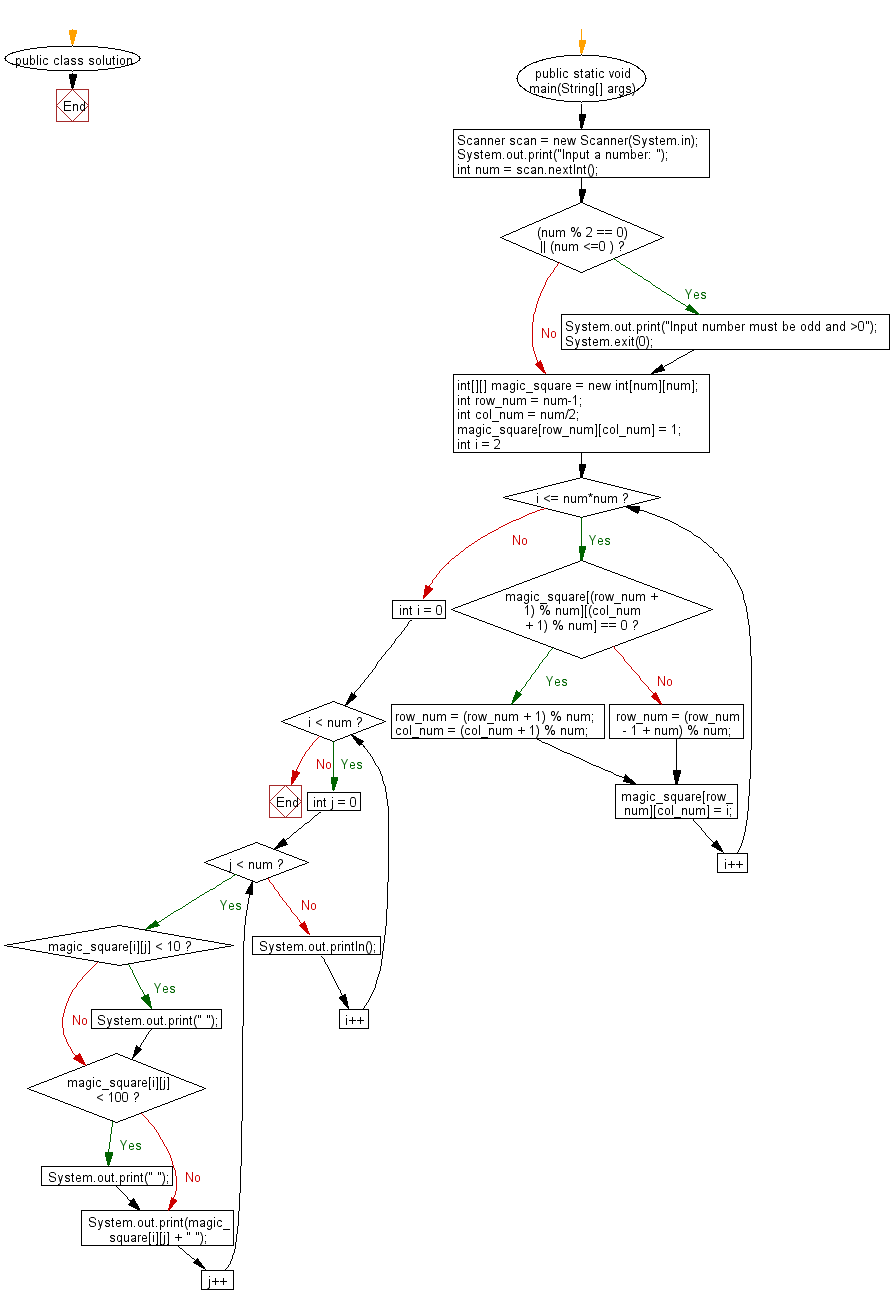Java: Generate a magic square of order n
Generate Magic Square
Write a Java program to generate a magic square of order n (all row, column, and diagonal sums are equal).
From Wikipedia,
In recreational mathematics and combinatorial design, a magic square is a n x n square grid (where n is the number of cells on each side) filled with distinct positive integers in the range 1, 2, ..., n2 such that each cell contains a different integer and the sum of the integers in each row, column and diagonal is equal. The sum is called the magic constant or magic sum of the magic square. A square grid with n cells on each side is said to have order n.
Sample Solution:
Java Code:
import java.util.*;
public class solution {
public static void main(String[] args) {
Scanner scan = new Scanner(System.in);
System.out.print("Input a number: ");
int num = scan.nextInt();
if ((num % 2 == 0) || (num <=0 ))
{
System.exit(0);
System.out.print("Input number must be odd and >0");
}
int[][] magic_square = new int[num][num];
int row_num = num-1;
int col_num = num/2;
magic_square[row_num][col_num] = 1;
for (int i = 2; i <= num*num; i++) {
if (magic_square[(row_num + 1) % num][(col_num + 1) % num] == 0) {
row_num = (row_num + 1) % num;
col_num = (col_num + 1) % num;
}
else {
row_num = (row_num - 1 + num) % num;
}
magic_square[row_num][col_num] = i;
}
// print the square
for (int i = 0; i < num; i++) {
for (int j = 0; j < num; j++) {
if (magic_square[i][j] < 10) System.out.print(" ");
if (magic_square[i][j] < 100) System.out.print(" ");
System.out.print(magic_square[i][j] + " ");
}
System.out.println();
}
}
}
Sample Output:
Input a number: 13 79 94 109 124 139 154 169 2 17 32 47 62 77 78 80 95 110 125 140 155 157 3 18 33 48 63 64 66 81 96 111 126 141 156 158 4 19 34 49 50 65 67 82 97 112 127 142 144 159 5 20 35 36 51 53 68 83 98 113 128 143 145 160 6 21 22 37 52 54 69 84 99 114 129 131 146 161 7 8 23 38 40 55 70 85 100 115 130 132 147 162 163 9 24 39 41 56 71 86 101 116 118 133 148 149 164 10 25 27 42 57 72 87 102 117 119 134 135 150 165 11 26 28 43 58 73 88 103 105 120 121 136 151 166 12 14 29 44 59 74 89 104 106 107 122 137 152 167 13 15 30 45 60 75 90 92 93 108 123 138 153 168 1 16 31 46 61 76 91
Flowchart:

For more Practice: Solve these Related Problems:
- Write a Java program to generate an odd-order magic square using the Siamese method recursively.
- Write a Java program to generate a magic square of order n using iterative techniques and then verify the magic sum.
- Write a Java program to validate a generated magic square by confirming that all rows, columns, and diagonals sum to the same value.
- Write a Java program to generate a magic square and then rotate it to ensure the magic property is preserved.
Go to:
PREV : Count Numbers Without 7.
NEXT : Sieve of Eratosthenes for Primes.
Java Code Editor:
Contribute your code and comments through Disqus.
What is the difficulty level of this exercise?
Test your Programming skills with w3resource's quiz.
